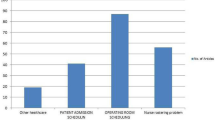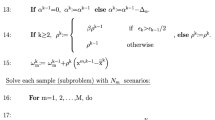Abstract
Demands for cost-efficient and just-in-time service systems have rapidly increased due to the present-day competitive resource allocation. We focus on optimizing policies for highly efficient service systems because customer congestion often arises from suboptimal policies rather than flawed arrangements. Quasi and metaheuristic optimization techniques are widely employed to establish cost-optimal service policies, mitigating customer congestion, primarily caused by unplanned policies or inadequate facilities. This article initially introduces a notion of unreliable service and the F-policy for stochastic modeling of finite capacity customer service systems. Next, we utilize the recently-developed and proficient Grey Wolf Optimizer, a metaheuristic approach, along with the Quasi-Newton method, to determine the optimal values of decision parameters for a cost-efficient service systems. This is achieved through extensive numerical experiments that encompass diverse service characteristics, customer behavior, and performability measures. The results emphasizes the importance of both preventive and corrective actions for enhancing service system efficiency. Our findings also highlight the practicality of the Grey Wolf Optimization approach and stochastic modeling in achieving efficient policies and optimizing performance for the studied service model. In general, the F-policy is widely adopted for controlling queueing systems across various industries such as telecommunications, transportation, and healthcare, where maintaining reasonable wait times, service levels, and system stability is crucial. This article contributes to the mathematical modeling of this approach. Nonetheless, further research is needed to validate and simulate these findings in industrial settings.











Similar content being viewed by others
Data availability
Data sharing not applicable to this article as no datasets were generated or analysed during the current study.
References
Abbasi-khazaei T, Rezvani MH (2022) Energy-aware and carbon-efficient \(\text{ VM }\) placement optimization in cloud datacenters using evolutionary computing methods. Soft Comput 26(18):9287–9322
Aguila Leon J, Vargas Salgado C, Chiñas Palacios C, Díaz-Bello D (2023) Solar photovoltaic maximum power point tracking controller optimization using grey wolf optimizer: \(\text{ A }\) performance comparison between bio-inspired and traditional algorithms. Expert Syst Appl 211:118700
Al Thobiani F, Khatir S, Benaissa B, Ghandourah E, Mirjalili S, Wahab MA (2022) A hybrid \(\text{ PSO }\) and grey wolf optimization algorithm for static and dynamic crack identification. Theor Appl Fract Mech 118:103213
Alaoui SB, Tissir EH, Chaibi N (2020) Analysis and design of robust guaranteed cost active queue management. Comput Commun 159:124–132
Ali S, Bhargava A, Saxena A, Kumar P (2023) A hybrid marine predator sine cosine algorithm for parameter selection of hybrid active power filter. Mathematics 11(3):598
Aziz RM, Mahto R, Goel K, Das A, Kumar P, Saxena A (2023) Modified genetic algorithm with deep learning for fraud transactions of ethereum smart contract. Appl Sci 13(2):697
Chouar A, Tetouani S, Soulhi A, Elalami J (2021) Performance improvement in physical internet supply chain network using hybrid framework. IFAC-Pap OnLine 54(13):593–598
Devanda M, Shekhar C, Kaswan S (2023) Fuzzified imperfect repair redundant machine repair problems. Int J Syst Assur Eng Manag. https://doi.org/10.1007/s13198-023-01922-3
Esfeh MA, Saidi S, Wirasinghe S, Kattan L (2022) Waiting time and headway modeling considering unreliability in transit service. Transp Res Part A: Policy Pract 155:219–233
Faris H, Aljarah I, Al Betar MA, Mirjalili S (2018) Grey wolf optimizer: a review of recent variants and applications. Neural Comput Appl 30:413–435
Ford J, Moghrabi I (1994) Multi-step quasi-\(\text{ Newton }\) methods for optimization. J Comput Appl Math 50(1–3):305–323
Ghalambaz M, Yengejeh RJ, Davami AH (2021) Building energy optimization using grey wolf optimizer (\(\text{ GWO }\)). Case Stud Thermal Eng 27:101250
Gupta SM (1995) Interrelationship between controlling arrival and service in queueing systems. Comput Oper Res 22(10):1005–1014
Hassan BA, Moghrabi IA (2023) A modified secant equation quasi-\(\text{ Newton }\) method for unconstrained optimization. J Appl Math Comput 69(1):451–464
Indramaya E, Suyanto S (2021) Comparative study of recent swarm algorithms for continuous optimization. Procedia Comput Sci 179:685–695
Jafari V, Rezvani MH (2021) Joint optimization of energy consumption and time delay in \(\text{ IoT }\)-fog-cloud computing environments using nsga-ii metaheuristic algorithm. J Ambient Intell Hum Comput 14:1675–1698
Jain M, Sanga SS (2020) Admission control for finite capacity queueing model with general retrial times and state-dependent rates. J Ind Manag Optim 16(6):2625–2649
Jain M, Sanga SS (2020) State dependent queueing models under admission control \(\text{ F }\)-policy: a survey. J Ambient Intell Hum Comput 11:3873–3891
Kao C, Song WT, Chen SP (1997) A modified quasi-\(\text{ Newton }\) method for optimization in simulation. Int Trans Oper Res 4(3):223–233
Karupothu UP, Kumar P (2020) Perceptionization of \(\text{ FM }/\text{FD }/1\) queuing model under various fuzzy numbers. Croatian Oper Res Rev 11(1):135–144
Ke JC, Wu CH, Pearn WL (2013) Analysis of an infinite multi-server queue with an optional service. Comput Ind Eng 65(2):216–225
Kumar A, Kaswan S, Devanda M, Shekhar C (2023) Transient analysis of queueing-based congestion with differentiated vacations and customer’s impatience attributes. Arab J Sci Eng 48:15655–15665
Kumar H, Tyagi I (2019) Implementation and comparative analysis of \(\text{ k }\)-means and fuzzy c-means clustering algorithms for tasks allocation in distributed real time system. Int J Embedded Real-Time Commun Syst (IJERTCS) 10(2):66–86
Kumar N, Kumar H (2022) A fuzzy clustering technique for enhancing the convergence performance by using improved fuzzy c-means and particle swarm optimization algorithms. Data Knowl Eng 140:102050
Kumar N, Kumar H, Kumar K (2022) A study for plausible third wave of covid-19 in india through fuzzy time series modelling based on particle swarm optimization and fuzzy c-means. Math Probl Eng. https://doi.org/10.1155/2022/5878268
Li L, He Y, Zhang H, Fung JC, Lau AK (2023) Enhancing \(\text{ IAQ }\), thermal comfort, and energy efficiency through an adaptive multi-objective particle swarm optimizer-grey wolf optimization algorithm for smart environmental control. Build Environ 235:110235
Mirjalili S (2016) \(\text{ SCA }\): \(\text{ A }\) sine cosine algorithm for solving optimization problems. Knowl-Based Syst 96:120–133
Mirjalili S, Mirjalili SM, Lewis A (2014) Grey wolf optimizer. Adv Eng Softw 69:46–61
Patterson J, Korzeniowski A (2018) \(\text{ M }\)/\(\text{ M }\)/\(1\) model with unreliable service. Int J Stat Probab 7(1):125–136
Patterson J, Korzeniowski A (2019) \(\text{ M }/\text{M }/1\) model with unreliable service and a working vacation. Int J Stat Probab 8(2):1–10
Prameela KU, Kumar P (2020) Conceptualization of finite capacity single-server queuing model with triangular, trapezoidal and hexagonal fuzzy numbers using \(\alpha\)-cuts. In: Numerical Optimization in Engineering and Sciences: Select Proceedings of NOIEAS 2019, pp 201–212. Springer,
Rani S, Jain M, Meena RK (2023) Queueing modeling and optimization of a fault-tolerant system with reboot, recovery, and vacationing server operating under admission control policy. Math Comput Simul 209:408–425
Shekhar C, Varshney S, Kumar A (2020) Optimal and sensitivity analysis of vacation queueing system with \(\text{ F }\)-policy and vacation interruption. Arab J Sci Eng 45:7091–7107
Shekhar C, Varshney S, Kumar A (2021) Standbys provisioning in machine repair problem with unreliable service and vacation interruption. In: The Handbook of Reliability, Maintenance, and System Safety through Mathematical Modeling, pp 101–133. Elsevier
Wang KH, Yang DY (2009) Controlling arrivals for a queueing system with an unreliable server: Newton-quasi method. Appl Math Comput 213(1):92–101
Wang KH, Kuo CC, Pearn WL (2007) Optimal control of an \(\text{ M }/\text{G }/1/\text{K }\) queueing system with combined \(\text{ F }\) policy and startup time. J Optim Theory Appl 135:285–299
Wang KH, Kuo CC, Pearn W (2008) A recursive method for the \(\text{ F }\)-policy \(\text{ G }/\text{M }/1/\text{K }\) queueing system with an exponential startup time. Appl Math Model 32(6):958–970
Wills AG, Schön TB (2021) Stochastic quasi-\(\text{ Newton }\) with line-search regularisation. Automatica 127:109503
Wu CH, Yang DY (2021) Control charts for the expected system size of markovian queues under \(\text{ F }\)-policy. Qual Technol Quant Manag 18(5):576–596
Wu CH, Yang DY, Yong CR (2023) Performance evaluation and bi-objective optimization for F-policy queue with alternating service rates. J Ind Manag Optim 19(5):3819–3839
Yang DY, Wu CH (2015) Cost-minimization analysis of a working vacation queue with \(\text{ N }\)-policy and server breakdowns. Comput Ind Eng 82:151–158
Yang DY, Yang NC (2018) Performance and cost analysis of a finite capacity queue with two heterogeneous servers under \(\text{ F }\)-policy. Int J Serv Oper Inf 9(2):101–115
Yang DY, Wang KH, Wu CH (2010) Optimization and sensitivity analysis of controlling arrivals in the queueing system with single working vacation. J Comput Appl Math 234(2):545–556
Yang DY, Ke JC, Wu CH (2020) Randomized control of arrivals in a finite-buffer \(\text{ GI }/\text{M }/1\) system with starting failures. RAIRO-Operations Research 54(2):351–367
Yang DY, Chang PK, Cho YC (2021) Optimal control of arrivals in a \(\text{ G }/\text{G }/\text{c }/\text{K }\) queue with general startup times via simulation. Int J Manag Sci Eng Manag 16(1):27–33
Zamfirache IA, Precup RE, Roman RC, Petriu EM (2022) Policy iteration reinforcement learning-based control using a grey wolf optimizer algorithm. Inf Sci 585:162–175
Zhang H, Ni Q (2015) A new regularized quasi-\(\text{ Newton }\) algorithm for unconstrained optimization. Appl Math Comput 259:460–469
Zhao FJ, Du X, Ma YH, Sun XM, Wang K (2021) Optimization and control for variable cycle engine based on grey wolf algorithm. IFAC-PapersOnLine 54(10):465–470
Funding
Data sharing does not apply to this article as no datasets were generated or analyzed during the current study. The first author (MD) extends his sincere thanks to the funding agency CSIR-UGC, India, for the financial support (SRF/NET 1081/(CSIR-UGC NET DEC. 2018)).
Author information
Authors and Affiliations
Corresponding author
Ethics declarations
Conflict of interest
The author declares that there is no conflict of interest regarding the publication of this paper. The authors acknowledge their sincere thanks to the anonymous reviewer and the editorial board member for considering our manuscript for possible publication.
Additional information
Publisher's Note
Springer Nature remains neutral with regard to jurisdictional claims in published maps and institutional affiliations.
Mahendra Devanda: SRF: SRF/NET (1081/ (CSIR-UGC NET DEC. 2018)).
Rights and permissions
Springer Nature or its licensor (e.g. a society or other partner) holds exclusive rights to this article under a publishing agreement with the author(s) or other rightsholder(s); author self-archiving of the accepted manuscript version of this article is solely governed by the terms of such publishing agreement and applicable law.
About this article
Cite this article
Devanda, M., Kaswan, S. & Shekhar, C. Quasi and metaheuristic optimization approach for service system with strategic policy and unreliable service. J Ambient Intell Human Comput 15, 2295–2315 (2024). https://doi.org/10.1007/s12652-024-04756-4
Received:
Accepted:
Published:
Issue Date:
DOI: https://doi.org/10.1007/s12652-024-04756-4




